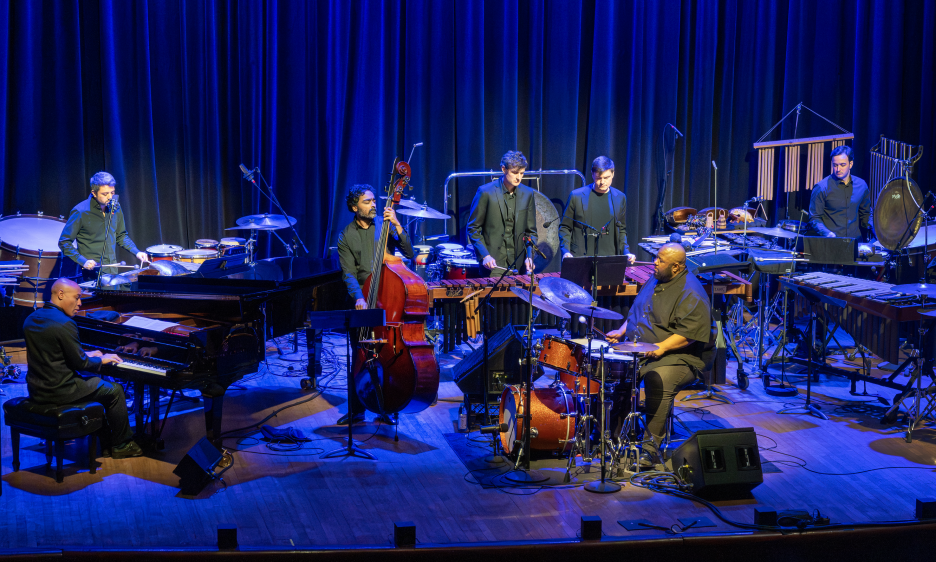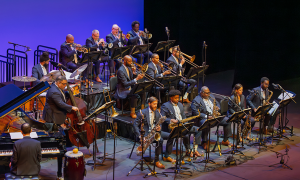Home » Jazz Articles » Live Review » Tyshawn Sorey and Sandbox Percussion at 92NY
Tyshawn Sorey and Sandbox Percussion at 92NY

Courtesy Richard Termine
This was a salute to a jazz giant that eschewed the artist’s best-known jazz playing, in favor of his legacy as a composer and leader of the all-percussion M'Boom.
92NY
"Max Roach at 100"
New York City
February 21, 2025
Serious and uncompromising artist that he was, drummer Max Roach would have appreciated the singularly offbeat—if you will—tribute that Tyshawn Sorey paid to him at 92NY. "Max Roach at 100" was a salute to a jazz giant that eschewed the artist's best-known jazz playing. No bebop or hard bop. Not even an unaccompanied drum solo, to recognize that cornerstone of Roach's legacy.
Roach was much more than a great jazz drummer, of course, and the evening succeeded beautifully in spotlighting lesser-known aspects of his artistry. Sorey, a musical renaissance man in his own right, focused on Roach as composer, and as leader of M'Boom, his 1980s all-percussion ensemble.
True to Sorey's vision for the show, even the most conventional-jazz portion of the evening—an opening trio set of Roach compositions, played as a continuous suite—was far from jazzy in any mainstream sense. For the opener "Sunday Afternoon," Sorey chose to forego the conventional drumming of the Roach recording—from the album It's Time (Impulse!, 1962) credited to Max Roach, His Chorus and Orchestra. Instead, he sustained sweeping washes of drumming that barely settled into a groove. Pianist Aaron Diehl and bassist Harish Raghavan followed suit, playing the appealing theme and changes with a loose, freewheeling feel.
The trio then segued into "Almost Like Me," whose initial tighter structure soon gave way to exchanges between Diehl, playing fragmented phrases and rippling waves of notes, and an occasionally explosive Sorey. The piano-bass dueling continued in the concluding "It's Time." But in place of the arrangement on the Roach recording, in which the master drummer repeatedly played unaccompanied solos between the song's repeating piano figure, Sorey and Diehl played—and battled—together throughout.
At the end of "It's Time," members of Sandbox Percussion joined in briefly, before the Sorey trio exited and the uninterrupted set became an all-percussion affair. Over three pieces—one of which, "Morning/Midday," drew from the M'Boom repertoire—the quartet was remarkably subdued for a bunch of young percussionists. The music only occasionally rose in rhythmic intensity, as with a furious xylophone and drum kit duet in the middle of "Joy Boy"—a Julius Eastman piece.
For much of its half hour, the Sandbox set was dominated by the likes of serene vibraphone, both malleted and bowed, and gentle cymbal washes. This was music less concerned with rhythmic pyrotechnics than the gentle sonorities of the diverse instrumentation, which included shakers, gongs, a full drum kit, and upright chimes.
The trio rejoined Sandbox for the final third, which featured a new Sorey composition co-commissioned by 92NY, New Jersey Performing Arts Center, and the Library Of Congress. "Cogitations" seeks to champion Roach, Sorey wrote in the program notes, by combining "hand-in-hand, spontaneous composition and the formality of structure."
True to Sorey's goal, it was hard in places to discern what was written and what improvised. "Cogitations," like the Sandbox solo set, began with disparate sounds, this time including the tinkle of piano and rumbles from the bass. Sorey's sonic palette eventually widened to include tom-toms that he detuned in mid-set to emit a different, more thudding tone.
The septet's set eventually built to the blazing polyrhythmic peak one expects from a stage full of drummers, led by Sorey's full-set cannonades, before dying down to a single sound —the intermittent pealing of the upright chimes. After a few seconds of silence, Sorey said a simple "thank you" and this singular and satisfying evening was over.
For Roach aficionados, Sorey's tribute sounded the starting pistol for other one-hundredth-year celebrations soon in New York. Those include the tribute by Terri Lyne Carrington at Smoke Jazz & Supper Club to We Insist!, the politically charged 1960 suite Roach recorded with his then-wife, Abbey Lincoln.
Tags
Live Review
Tyshawn Sorey
Paul Reynolds
United States
New York
New York City
Max Roach
Aaron Diehl
Julius Eastman
New Jersey Performing Arts Center
Library of Congress
Terri Lyne Carrington
Smoke Jazz & Supper Club
We Insist!
Abbey Lincoln
PREVIOUS / NEXT
Tyshawn Sorey Concerts
Mar
14
Sat
Support All About Jazz
 All About Jazz has been a pillar of jazz since 1995, championing it as an art form and, more importantly, supporting the musicians who make it. Our enduring commitment has made "AAJ" one of the most culturally important websites of its kind, read by hundreds of thousands of fans, musicians and industry figures every month.
All About Jazz has been a pillar of jazz since 1995, championing it as an art form and, more importantly, supporting the musicians who make it. Our enduring commitment has made "AAJ" one of the most culturally important websites of its kind, read by hundreds of thousands of fans, musicians and industry figures every month.

























